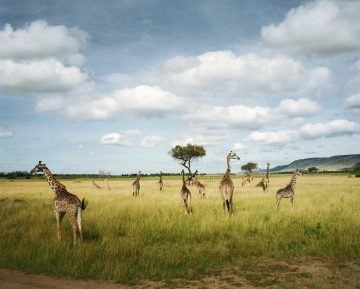Jon Lee Anderson in The New Yorker:
 The week before Christmas, Richard Leakey, the Kenyan paleoanthropologist and conservationist, celebrated his seventy-fifth birthday. He is lucky to have reached the milestone. A tall man with the burned and scarred skin that results from a life lived outdoors, Leakey has survived two kidney transplants, one liver transplant, and a devastating airplane crash that cost him both of his legs below the knee. For the past quarter century, he has moved around on prosthetic limbs concealed beneath his trousers. In his home town of Nairobi, Leakey keeps an office in an unlikely sort of place—the annex building of a suburban shopping mall. His desk and chair fill most of his cubicle, which has a window that looks onto a parking lot.
The week before Christmas, Richard Leakey, the Kenyan paleoanthropologist and conservationist, celebrated his seventy-fifth birthday. He is lucky to have reached the milestone. A tall man with the burned and scarred skin that results from a life lived outdoors, Leakey has survived two kidney transplants, one liver transplant, and a devastating airplane crash that cost him both of his legs below the knee. For the past quarter century, he has moved around on prosthetic limbs concealed beneath his trousers. In his home town of Nairobi, Leakey keeps an office in an unlikely sort of place—the annex building of a suburban shopping mall. His desk and chair fill most of his cubicle, which has a window that looks onto a parking lot.
…When I asked Leakey for his thoughts about the future of Kenya’s wildlife, he was uncompromisingly bleak, predicting that most of the animals are unlikely to survive far beyond the middle of the century. The next thirty to fifty years would be decisive. “Over all, I’m in a very pessimistic short- to mid-term attitude,” he said. “While I applaud the good efforts being made to get microcosm survival and improvement, I am not persuaded of the prospects for wildlife unless something gives, and I don’t see it.”For Leakey, it all comes down to global climate change: “Our population is growing too fast; our resource base isn’t growing with it, and, with the crisis of climate change, whether you have a capital ‘C’ or not, the fact is that the mean temperature is getting warmer, the rainfall is getting less, the snowmelt is increasing, the ice formation is less, oceans are rising. It’s a strangulation grip on the environment, and there’s nothing Kenya can do to arrest climate change globally,” he said. “So if you take the change in climate and you take the impact of temperature and the unavailability of land to grow viable crops on, your animal husbandry is getting squeezed out because there isn’t the open-range land on which you can raise cattle which you can sell in markets, so there’s a narrowing down of the options for humanity, and how you fit people and animals into that has to be a big question mark.”
 The week before Christmas, Richard Leakey, the Kenyan paleoanthropologist and conservationist, celebrated his seventy-fifth birthday. He is lucky to have reached the milestone. A tall man with the burned and scarred skin that results from a life lived outdoors, Leakey has survived two kidney transplants, one liver transplant, and a devastating airplane crash that cost him both of his legs below the knee. For the past quarter century, he has moved around on prosthetic limbs concealed beneath his trousers. In his home town of Nairobi, Leakey keeps an office in an unlikely sort of place—the annex building of a suburban shopping mall. His desk and chair fill most of his cubicle, which has a window that looks onto a parking lot.
The week before Christmas, Richard Leakey, the Kenyan paleoanthropologist and conservationist, celebrated his seventy-fifth birthday. He is lucky to have reached the milestone. A tall man with the burned and scarred skin that results from a life lived outdoors, Leakey has survived two kidney transplants, one liver transplant, and a devastating airplane crash that cost him both of his legs below the knee. For the past quarter century, he has moved around on prosthetic limbs concealed beneath his trousers. In his home town of Nairobi, Leakey keeps an office in an unlikely sort of place—the annex building of a suburban shopping mall. His desk and chair fill most of his cubicle, which has a window that looks onto a parking lot.